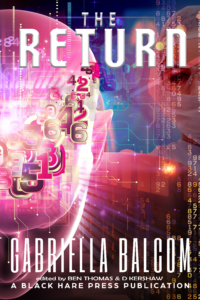What inspires you? Nature inspires me, along with smells, music, pictures, people I’ve met, places I’ve gone, and my own experiences—pretty much anything and everything.
Did you always want to be a writer? Were you an avid reader while growing up?
My father was in his late forties when he immigrated to New York from Slovenia, moving to Texas a few years later. He met my mother there and they married, having one child, me. He was a teacher and linguist. She’d taught before my birth, but didn’t work for a few years after. She taught me to read and write when I was very young, and I can’t remember a time I wasn’t surrounded by books and writing materials. They were a normal, everyday part of my life. I quite literally loved reading and writing, and they went hand-in-hand for me. My first “creations” included lists of things that started with the letters of the alphabet, but I moved on to stories. When I was six, I won a writing contest hosted by a local library; my tale was about animals who became friends and moved in together. I added poetry and journaling to my repertoire within a few years.
However, I stopped writing altogether after leaving home for college, staying super busy with classes and jobs. I later married, continued working, and had children, but grew even busier after divorcing and becoming a single parent. To say I met myself going and coming would be an understatement, and even though I often felt the urge to write, I didn’t.
In 2012, I couldn’t hold back the words anymore, and they poured out of me. It was like a floodgate had opened, and it’s been that way ever since. Writing was cathartic at first, but at the end of 2017 I had the idea to develop it into a career. I realized this would take practice, improved skills, and hard work, and joined my first Facebook writing group. When I came across a submission call for an anthology, I wrote two stories and submitted them after hiring my first editor. One was accepted, and I was ecstatic. I joined more writing groups, sent creations in for other themed calls, and more were published.
As the saying goes, the rest is history. I can’t not write, love when ideas pop into my mind and my characters “speak” to me, per se, and every acceptance thrills me.
What does literary success look like to you?
To me, success is when people enjoy my stories, want to read more of them, and buy copies of books that include my creations. I love when readers tell me how I’ve touched, inspired, astounded, or horrified them. My dream is to have several books published, put more out routinely, and be able to make a decent amount of money from my writing.
If you didn’t write, what would you do? Or, if writing is not a full-time job, what do you do?
I’d love to write full-time and be able to support myself that way, but I’m not at that point yet. My background is in Psychology and Criminal Justice, and I work full-time in the mental health field. I’ve dealt with families that epitomize the word “troubled,” abusive parents, abused children, substance users, and people in all types of situations. The majority of individuals I encounter are in crisis, with a fair number of them wanting to commit suicide, kill others, or experiencing psychosis. I arrange hospitalization at times, counsel now and then, and/or give referrals, depending on the situation.
What inspires you?
Nature inspires me, along with smells, music, pictures, people I’ve met, places I’ve gone, and my own experiences—pretty much anything and everything.
What is a little-known fact about you?
I’ll mention two. I was an only child, and grew up in a very abusive home.
What sparked the idea for this book?
I saw a submission call over a year ago for stories featuring bonds, and an idea came to me as I drove to work one day. Scenes played through my mind, with my story developing rapidly. Originally, I wrote around 7,500 words, but the call was for shorter stories, so I ended up doing two versions—one shorter, the other longer. I submitted my story and it was declined, but that didn’t bother me, because I felt “The Return” was one of my best works and knew I’d do something with it later.
Black Hare Press eventually announced a call for 20,000-to-40,000-word stories for their Deep Underground series, and I was intrigued immediately. I reread my story, and new ideas and scenes began flooding my mind. In no time at all, my story was the correct length.
How many half-finished and unpublished books do you have right now?
Several. In 2020, I wrote a novella of short stories for JayZoMon’s Open Contract Challenge, which awards authors publishing contracts, and my book was awarded third place. Later a competitor backed out, and I was offered second place. I had to decline, as another publisher had already talked with me by then about publishing my novella.
I have two longer projects I’d begun and made good progress on, but I had to set one aside when my first book came out. The other was delayed when I had to deal with a close relative’s crisis. I have various manuscripts in different stages of completion, ranging in length from 25,000 words to 45,000. And, at some point, I hope to revisit novels I’d written between 2012 and 2017. No doubt I’ll have to rewrite them, as my writing has improved since then.
What’s brewing? What projects are you working on?
I’m working on quite a few stories ranging from drabble to novel length, along with poems. They’re all different genres—fantasy, science fiction, horror, romance, children’s stories, etc., and some are complete, others partial. I created a few in response to themed calls, while others just came to me. I plan to work on them over time, and submit some for consideration in anthologies. Others I’d very much like to self-publish myself.



The Return by Gabriella Balcom – Launches 26th March 2021
/by LyndseyWhat inspires you? Nature inspires me, along with smells, music, pictures, people I’ve met, places I’ve gone, and my own experiences—pretty much anything and everything.
The Return by Gabriella Balcom
/by Black Hare PressThe world doesn’t know about the compound hidden underground, and the wealthy investors funding it want things to stay as they are. Although it’s 2027 with numerous scientific advances having been made, most of the research being conducted in the facility is illegal. If animal rights activists had an inkling of what went on, they’d clamour for justice. Human rights’ activists would scream from the rooftops.
YEAR ONE
/by Black Hare PressTime to Retreat
/by Gabriella Balcomby Gabriella Balcom As Pam picked a dahlia, something jabbed her finger. She was perplexed to discover a thorn—dahlias weren’t supposed to have any. Not wanting to be gouged again, she tried to snip off the thorn with her clippers, but the plant pulled away. Pam frowned and figured she must’ve imagined the movement. […]